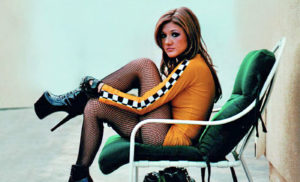Lena Dunham made her name pushing back against the extremes of sex positivity. In the second episode of the TV series Girls, which she wrote and starred in, her character capitulates to a sex partner’s insistence that they act out a nymphet fantasy. At the time, Lena said: “It’s definitely going to evoke the feeling like, ‘Why is this self-respecting woman doing this, and if so, is she a self-respecting woman?’” But then she explained her motivation: “relationship statuses are becoming more and more ambiguous in our modern Facebook, texting, Twitter world. And [it] can be really interesting and can also be damaging … you don’t understand how invested in you they are.”
What has happened to Lena? That is one of the questions that rushed through my head when, after two attempts, I made it through Sharp Stick, her first feature since 2011. Others included: what is wrong with this film? Is it a test of the inanity of contemporary critics? Or is she baiting us to cancel her? Or has she, all along, been just as idiotic, just as narcissistic, just as myopic as her crudest haters insisted?
I feel insane even describing the film’s plot. The protagonist Sarah Jo, a 26-year-old caretaker for a child with Down’s Syndrome, begs his man-child father to take her virginity (she had an emergency hysterectomy at age 17, which sexually stunted her). This causes her to instantly transform into an infantile nymphomaniac. Soon enough into the sometimes mushrooms-fuelled, sometimes porn-fuelled, affair, the mother — a sharp-tongued and overbearing businesswoman portrayed by Lena herself, in some strange self-hating gesture — finds out. (Actually, she finds out on the floor of the kitchen after she slips in a pool of her own amniotic fluid.) Sarah Jo is fired — and finds solace in an ethical porn star who resembles her ex-lover. (He addresses the camera with words like “I feel so connected to you” and “I admire your commitment to women’s personal expression”.)
Worried she’s bad at sex, Sarah Jo embarks on a journey of self-discovery that involves hanging elementary-school arts-and-craftsy checklists of extreme sexual acts around her room and soliciting men on fetish apps to participate in them. At one point she jumps out of the bushes and screams at the family she used to work for, “I did bukkake!” The disabled child and newborn react with distress.
The film has received some praise, which has appeared in Instagram ads featuring suggestive photos of the film’s completely conventionally attractive star, Kristine Froseth, who has modelled for Chanel, Armani and Prada. Vanity Fair called it “Supremely Funny”; Rolling Stone claimed it was “both absurd and enlightening” (in fairness, they were running an interview with Lena; to be honest might have been impolitic). But, in a refreshing show of lucidity in the face of a star-studded film that was very diverse — perhaps to clumsily rebuke critics of Girls’s whiteness — most outlets have panned it. To quote The New York Times’s Manohla Dargis: “There’s no point in enumerating all the reasons I dislike it”.
Perhaps critics feel unusually free to be honest about this awful film because of a perplexing controversy around its creation. Apparently Forseth, who plays Sarah Jo, reached out to Amy Gravino, the autism activist — known for her “Why Autism is Sexier Than You Think” TedTalk — about consulting on the film. Then the creators suddenly decided that Forseth’s character would not be autistic. According to Gravino, though, the character is “clearly” coded as autistic, and the “dehumanising” film participates in the “infantilisation of people on the spectrum”.
Sarah Jo is certainly childish: she’s constantly smearing yoghurt all over her mouth, and a baby-talking bartender has to teach her how to drink as she holds a wine cup with two hands like a sippy-cup. She dresses in the kind of upmarket baby clothes that are now so often found draped on the underweight and affluent. When her sister asks her to stop openly scratching her genitals, her mother asks: “Is it a wiping issue?” And it goes beyond credulity, into broad comedy, for this 26-year-old — adoring daughter of a potty-mouthed, aged-out tart and loyal sister of a viral TikToker who can’t identify the father of her child — to respond to “Can I go down on you?” with (bug-eyed smile, high-pitched squeal): “Down where?!”
Along with a screener, the film’s marketers sent me Lena’s “Director’s Statement”: it was, I was told, “worth reading”. The last three films I’ve written about have brandished a similar exegesis: is this phenomenon an expression of condescension toward audiences, or fear of their wrath? Appropriately, the Statement revealed that this is an ideologically unimpeachable film: during the pandemic, the chronically ill Dunham came to reflect on her life. In Sarah Jo, she developed a character who experienced her physical challenges — a complete hysterectomy due to chronic endometriosis — and emotional challenges — “often feeling as if life and romance, and womanhood on the whole, are a secret that everyone is in on except for me.”
Contemplating the portrayal of sexually active women in film, Lena thought about how they so often end up either murdered or at least subjected to “a torture of judgment, of questioning, of self-doubt and loneliness and regret over choices that should ultimately just be part of the fabric of self-actualisation in that same way it can be for their male counterparts”. So, she “began to imagine a character whose sexual journey would be totally unique, unmarred by shame or self-hate or the projections of others. She would use sex not to destroy her body but to heal it from a history of medicalised trauma and cultural projection”. Hence, Sarah Jo’s “private and judgment free sexual journey”.
How to portray that? As Lena concludes: “I pushed myself to write this script with honesty and a certain demented purity. When I asked this story what it needed from me, I simply heard Sarah Jo telling me ‘Please don’t try and make me cute.’ And so, I let her rage.”
I suppose there is a certain “demented purity” to Sarah Jo — but is it truly countercultural to show a woman empowering herself through watching porn and speedrunning through the “categories” with faceless strangers? In a world where yonic prosthetics are advertised on public transport, do contemporary media narratives actually discount female pleasure? Is it all that subversive to show a Scandinavian model begging for another go in up-to-the-minute fashions? Girls, by contrast, was brave enough to show Lena Dunham naked — naked and dismayed.
Indeed, Lena’s brilliance has always been her attention to the disappointments of sexual liberation. I remember seeing her first film, Tiny Furniture, at the local arthouse theatre when I was 17; amid so many EU-funded multinational WWI dramas and mumblecores about dumpy Portlanders with regrettable tattoos, it was shockingly relevant. Its last scene is one of the greatest portraits, today, of the false promise of hook-up culture: Lena’s character finally seduces the hot guy, which means him pulling down her pants and using her for a few moments in an abandoned drain pipe.
What happened to that Lena? Of course, she’s always seemed like a terrible person — but her early work portrayed her failures with a clear-eyed precision that cut through the noise. She seemed to know that all her characters were awful. Why is she now saying, “I think we have enough messaging in society, and probably in my 20s I contributed to it, that said, like, ‘porn is ruining sex, and it’s making it so hard for people’”?
Sharp Stick is entertaining in the sense that it offers the rubbernecking fascination of the worst trainwrecks. But the coming-of-age via kink here is so devoid of any plausibility, let alone subtlety, that this seems almost like a dystopian send-up of a 2010s sex romp. If this bizarre, borderline paedophilic fantasy is a failure, though, it’s not a vindication because Lena has always been so awful; it’s a shame because she used to be so exceptional. Either Lena is truly the most brilliant performance artist of a generation, or one of its biggest casualties.
Wherefore this fantasy of frictionless sex, of anonymous encounters with randy internet strangers? Why on Earth would this be the way to heal from sexual injury? I suppose the director of Sharp Stick couldn’t really convince herself either: the film concludes in textbook white knight fashion. Sarah Jo’s saviour is a handsome porn-industry PA who won’t have sex with her without getting to know her (which she’s not interested in). Instead, he goes to epic lengths to “heal her trauma”. In a gesture of saintliness, he shares her fan mail with the ethical porn star she’s obsessed with, who tells her to be “proud of your fucking scars”. Finally, she accepts his love: going off-checklist and allowing him to gently caress her.
I suppose this is a familiar problem with feminist art: do female characters really want the hyper-efficient, attachment-free anti-intimacy of their masculine counterparts? As Lena bemoaned in her Director’s Statement, women don’t get an Alfie — but do they want one? Even Carrie Bradshaw ended up with Mr. Big, and in Sally Rooney’s latest, a few hundred pages of light BDSM neatly tie up in two couples, plus a baby on the way. The marriage plot certainly originates in a world of primogeniture and patriarchy; but perhaps abandoning all sentiment and sensitivity is a patriarchal fantasy as well.
I don’t believe Lena could resist a little nuance: the free-wheeling mother here is a cautionary tale, as is the sister who, as her mother callously acknowledges at what appears to be an abortion party, can’t bring a baby into the “living realm”. The (lazily repetitive) montage of Sarah Jo and her multitudinous partners is far from alluring; the film’s only erotic scene is the final, tender, vanilla one.
Perhaps the title, here, is a giveaway: as Sarah Jo says of her sexual quest, it will be like “When I was a kid and the doctor was taking blood and the doctor said ‘This will just be a sharp stick’, and I knew it would hurt more than they said, so I beat them to it in my mind and that was my power”.
“I knew it would hurt more than they said”: this, I think, is Lena’s final assessment of so-called sexual freedom.
Disclaimer
Some of the posts we share are controversial and we do not necessarily agree with them in the whole extend. Sometimes we agree with the content or part of it but we do not agree with the narration or language. Nevertheless we find them somehow interesting, valuable and/or informative or we share them, because we strongly believe in freedom of speech, free press and journalism. We strongly encourage you to have a critical approach to all the content, do your own research and analysis to build your own opinion.
We would be glad to have your feedback.
Source: UnHerd Read the original article here: https://unherd.com/





